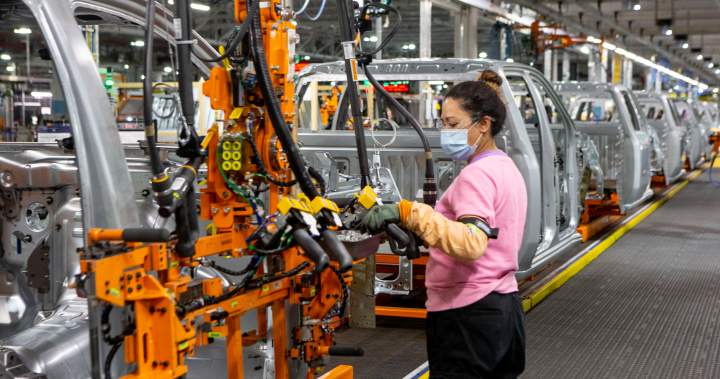Canada’s automotive industry is sounding the alarm that it would be “very damaging” if more tariffs are put into place — and also that some vehicle manufacturers are voicing concern about being seen as “too American” in the tense climate.
This comes after U.S. President Donald Trump abruptly cut off trade talks and declared he would add a 10 per cent tariff on top of current levies in place on Canada — a move Trump said was because of an anti-tariff commercial produced by the Government of Ontario.
A panel of representatives from Canada’s automotive sector met with a federal standing committee in Ottawa Monday to discuss the “challenging” environment that tariffs and the trade war have created.
“It would be extremely challenging if more tariffs go into place, particularly if they apply to all products that currently qualify under CUSMA,” said Brian Kingston, president and chief executive officer of the Canadian Vehicle Manufacturers’ Association (CVMA).
“So we don’t know yet how these will be applied, but an additional 10 per cent will be billions of dollars in costs onto this sector (automotive) and other Canadian sectors. So very damaging and hopefully we can find an off-ramp.”
Trump was not clear if the additional tariffs would apply to all sectors, or specifically-targeted industries, and on Monday did not say when asked when those might go into effect.
Carney responded to Trump pulling the plug on trade negotiations, saying, “We can’t control the trade policy of the United States.”

Trump’s tariff policies mean products may face additional costs if they do not fall under the terms of the Canada-United States-Mexico Agreement (CUSMA), which is set for a formal review in 2026.
Companies in many sectors, including automotive, have been pivoting to find alternative trading partners and adjusting their supply chains to avoid, or at least minimize the cost impact from tariffs.

Get daily National news
Get the day’s top news, political, economic, and current affairs headlines, delivered to your inbox once a day.
Some car companies warned tariffs could see their profits drop by billions of dollars by the end of 2025, with some shifting or closing production in Canada, which has led to job cuts.
Stellantis revealed earlier in October that it was planning on moving production of the Jeep Compass from Brampton, Ont., to Illinois in the U.S. — leaving thousands of jobs at risk of being eliminated.
Kingston on Monday was asked about the job security for Brampton workers at the Stellantis facility, and he said “there are plans for the Brampton plant — it is not a plant closure,” without getting into specifics.
General Motors also said it is ending production of its BrightDrop vehicles in Ontario.
In light of the Stellantis and General Motors news, Industry Minister Melanie Joly formed a “response group” aimed at preserving jobs.
Kingston added that there could be further plant closures and potential job cuts “the longer time goes by without a solid trade deal” that makes Canada a “competitive” market for companies to invest in.
When companies are hit by higher costs, they typically will try to offset the hit to their profits by increasing prices for customers. This means by having to pay tariffs, companies like Stellantis may have to increase prices for car buyers.
“You’re going to see vehicle prices go up US$4,000, $12,00, $15,000 — I don’t think people signed up for that. That is a potential outcome, but I ultimately think we will find a landing zone,” Kingston said.
Huw Williams, the national spokesperson for the Canadian Automobile Dealers Association, told the committee one of his client’s concerns was how “a number of our dealers, Ford, GM and Stellantis are worried about the knock-on effect of being seen as ‘too American.’”
A recent Ipsos poll conducted exclusively for Global News showed six in 10 Canadians said they could never trust the U.S. again because of Trump’s policies.
Trump has also repeated rhetoric that Canada should become “the 51st state” to avoid paying tariffs.

The panel was adamant that the best way forward to support the Canadian automotive sector and its workers is to negotiate a trade deal that sees all tariffs removed for finished vehicles and components crossing the Canada-U.S. border.
“The best deal for Canada is a situation where we adhere to the rules that were negotiated under the previous CUSMA. If those conditions are adhered to, then that should be the basis on which we continue to have zero tariffs on automobiles going back and forth across the border — and that’s where we need to get to,” said David Adams, president and CEO of Global Automakers of Canada.
“I think some people are saying ‘that’s wishful thinking.’ Well, maybe that’s one of the reasons why the negotiations are taking so long is because that’s the ultimate goal here.”
Williams also suggested that having a long-term trade deal may be worth waiting for.
“We’re concerned about getting a long-term deal. Yes, we need short-term certainty, but the big prize out here is to make sure we have a CUSMA deal.”
© 2025 Global News, a division of Corus Entertainment Inc.
More U.S. tariffs would be ‘very damaging,’ auto industry tells MPs





